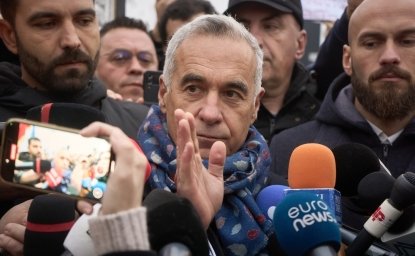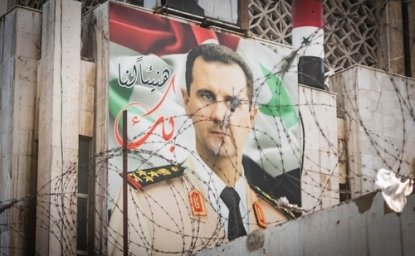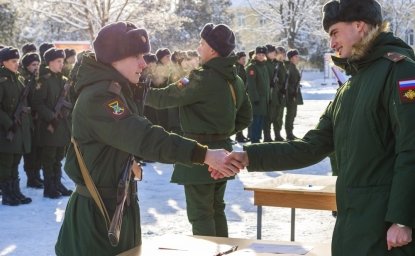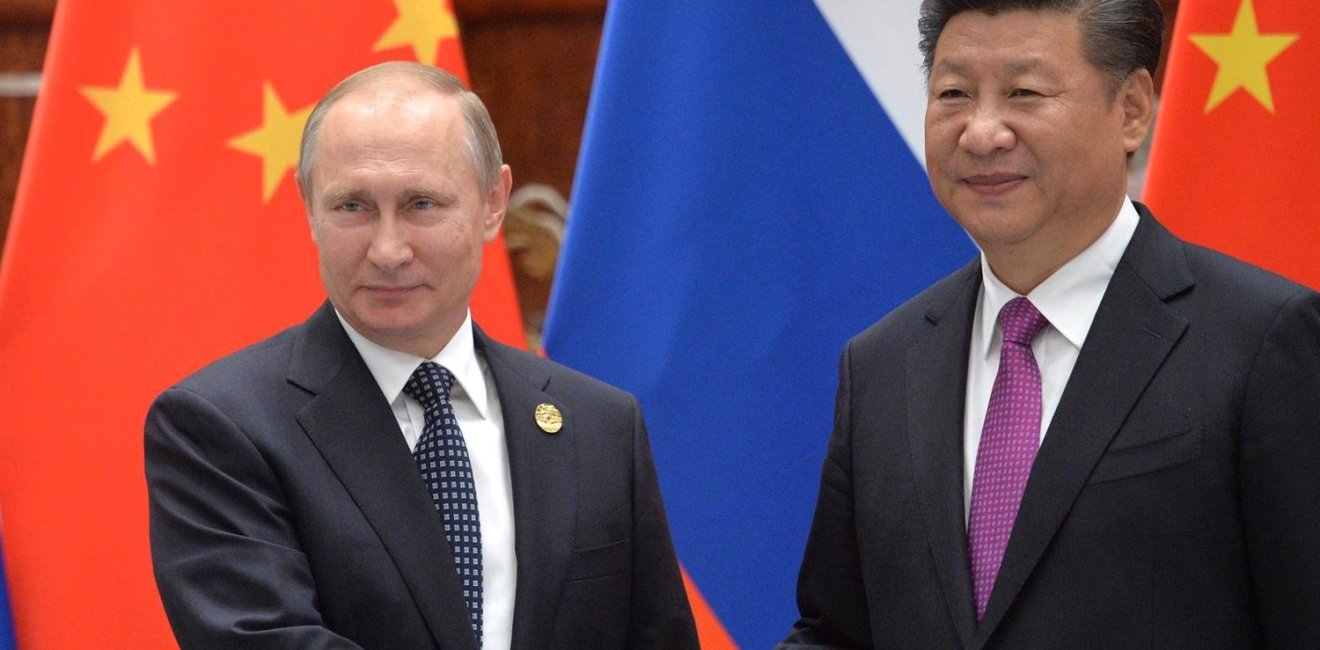
A blog of the Kennan Institute
After every meeting between Chinese president Xi Jinping and Russian president Vladimir Putin, the two sides issue warm statements and stress their growing cooperation. Especially since the war in Ukraine began in 2014, Russia has tacked ever closer to China, shedding some of its traditional fear of its southern neighbor and seeking to compensate for strained relations with the West by closer ties to China. Beijing, meanwhile, is happy to have Russia on its side in disputes such as that over the South China Sea. Disagreements between Russia and China remain, but there is little doubt that relations now are at their closest in decades.
Less frequently noted, however, is a partial convergence in Russian and Chinese domestic politics. Americans regularly group Russia and China together as “authoritarian powers,” but the reality is that the two countries’ domestic political systems operate very differently. Since taking power in Russia in 1999, Putin has emphasized the construction of a “vertical of power” in Russia, slashing the influence of provincial elites and centralizing control in the Kremlin. In China, meanwhile, political power has been no less authoritarian but much more decentralized.
Compared to Russia, elite groups in China play a relatively larger role in decision making, and the Chinese president has until recently had relatively less personal power. In China power has rotated, with presidents serving two five-year terms. The past three Chinese presidential transitions have given power to a different elite group. Jiang Zemin, president from 1993 to 2003, had a power base in Shanghai. Hu Jintao, who served from 2003 to 2013, came from the Communist Youth League faction. And Xi Jinping, the current Chinese president, represents a group of elites called the “princelings,” who are children of first-generation Communist Party leaders. This rotation of power has forced each group to govern effectively lest other groups mobilize against it on charges of incompetence.
Russia has no such system for rotating elites. Putin, to give the most obvious example, has governed Russia for 18 years and is likely to remain for many more. It is not only the Russian president who has remained constant. Many of the most powerful people in Russia have been in place for two decades. Igor Sechin, the CEO of Rosneft, has played a major role in Russian politics since the early days of Putin’s presidency. Sergei Shoigu, currently the defense minister, began his career as a minister in 1994.
Faced with the prospect of a Putin presidency through 2024—assuming he is reelected next year—some Russians compare their political system today to that under Soviet leader Leonid Brezhnev. Brezhnev, who led the USSR from the 1960s to the 1980s, had a policy called “stability of the cadres,” which guaranteed that the elites would not face purges, as they had under Stalin, or constant reorganization, as under leader Nikita Khrushchev. The result of Brezhnev’s “stability of the cadres” policy—coupled with his own slothful leadership—was stagnation. Half the members of the Soviet Politburo serving in the early 1980s had been in place a decade and a half earlier. Rotation of elites ground to a halt. New ideas stopped reaching top leaders, and the quality of management declined.
As he prepares to run for reelection in the spring of 2018, Putin realizes the risk of a new era of stagnation. Putin is unwilling to take steps to reinvigorate the economy, fearing the political cost. But he has looked toward China in trying to create a system of elite rotation, shaking up government by introducing new faces to top positions. In the fall of 2015, Putin allegedly sacked Vladimir Yakunin, the powerful head of Russian Railways and a longtime friend of Putin’s. In addition to allegations of corruption, Yakunin was criticized for mismanaging Russian Railways. The new CEO, Oleg Belozerov, is also alleged to have ties to oligarchs, but some in the industry hope that he will prove a more capable manager.
Late 2016 saw even bigger personnel changes. First, Putin accepted the resignation of Sergei Ivanov, who had served as his chief of staff since 2011. Ivanov was replaced by Anton Vaino, an official who is younger—only 44—and had a much lower public profile. Then, in October 2016, Sergei Kirienko was appointed first deputy chief of staff with responsibility for domestic politics. He replaced Viacheslav Volodin, the influential manager of Russia’s domestic political environment. Then long-serving Economy Minister Alexei Ulyukaev was arrested and replaced by 34-year-old Maxim Oreshkin.
It is possible that the personnel shakeup, like a cabinet reshuffle in a parliamentary democracy, will improve management. But replacing Putin’s assistants can only do so much.
It is possible that the personnel shakeup, like a cabinet reshuffle in a parliamentary democracy, will improve management. But replacing Putin’s assistants can only do so much. Unlike China’s system of elite rotation, none of these appointments will bring a new faction to power. More important, since Putin remains at the top, none of the new officials can overturn any policies associated with Putin.
The dilemma is that the sense of stagnation is caused not only by ossified management but also by specific policies. So long as Putin is at the helm, corrupt dealings associated with his friends will persist. The property rights of Russia’s largest businessmen will remain contingent on political support. A foreign policy that misunderstands Russia’s economic interests will continue. And civil society groups will continue to face skepticism if not suppression. None of this is likely to change without a change at the top.
China’s system of elite rotation has worked because since Deng Xiaoping, the country has been able to replace not only its mid-level leaders but also its presidents. Deng Xiaoping set up a system of rotation, selecting his immediate successor (Jiang Zemin) from one faction and selecting Jiang’s successor (Hu Jintao) from an alternative faction. Even after his death, therefore, Deng’s preferences shaped Chinese politics. But it is now 20 years since Deng’s death, and his handpicked successors are themselves now retiring. The rotation system that Deng established is no longer automatic.
No amount of mid-level political change can create such a system in Russia. Indeed, the greater irony is that even as Putin tries to replicate Chinese-style elite reshuffling, China is shifting toward the Russian model. Deng Xiaoping did not choose a successor to Xi Jinping, and there is no agreed-upon method for how China’s Communist Party should choose Xi’s replacement. Indeed, Xi is widely believed to be angling for an unprecedented third term as president. And Chinese supporters and critics of Xi agree that he has a new role model for centralizing control in China’s political system: Putin’s Russia. Even as Russia’ is struggling to replicate Chinese elite rotation, Xi is construction a vertical of power in Beijing.
Mr. Miller is associate director of the Program in Grand Strategy at Yale and a fellow at the Foreign Policy Research Institute.
Author

Kennan Institute
The Kennan Institute is the premier US center for advanced research on Eurasia and the oldest and largest regional program at the Woodrow Wilson International Center for Scholars. The Kennan Institute is committed to improving American understanding of Russia, Ukraine, Central Asia, the South Caucasus, and the surrounding region though research and exchange. Read more

Explore More in The Russia File
Browse The Russia File
In Search of Russia’s Digital Trace in Romania’s Political Crisis

With Syria’s Collapse Russia’s Regional Power Play Disintegrates

Putin's Strategy Tests Europe's Defense Limits

